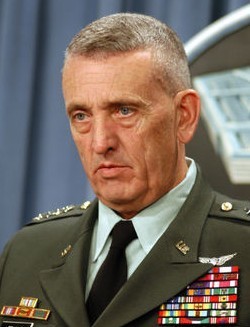Gourley's Strachan Files (III): Strategy is the first casualty of poor civ-mil relations

By Jim Gourley
Best Defense chief military culture correspondent
The Direction
of War has an entire
chapter on civil-military relations, in which Sir Hew Strachan discusses how
governments and their militaries ought to (but largely don't) interact
according to Clausewitz. But throughout the work he observes some interesting
dynamics about how a military's relationship with civilian society, as well as
government, change in war. The bottom line is that things go badly at home when
they don't go according to plan on the battlefield, and significantly worse
when you go to the battlefield without a plan in the first place.
"A new model of
civil-military relations is required, and it has to reflect the changing
character of war," he writes. He emphasizes four factors of change:
1. Today's wars are
"de facto wars," compared to the officially-declared kind that
dominated Clausewitz's era.
2. Conflicts are
"of low intensity, but are often persistent, continuous and
simultaneous."
3. Countries now
fight with all-volunteer forces. Strachan observes the same consequences often
discussed on this blog: separate societies, the question of civilians being able
to relate to their servicemembers, etc.
4. "Society's
image of war is mediated by the press."
But the military
creates its own share of problems with its cultural attitude (or rather, its
belief that it has a cultural attitude) of staying out of politics. "If
the media is such a powerful tool in the debates on the use of military force,
the armed forces need to cease behaving like rabbits caught in the headlights
of an oncoming vehicle. They should not react as though they honestly believe
that apolitical behaviour is the corollary of professionalism. Such responses
reflect the power of the Huntingtonian norm, not of reality. The US armed
forces lobby on Capitol Hill in a way which would affront British liberal
norms, and the link between success in high command and the presidency runs
through every 'existential' war the United States has fought," going all
the way from Washington to Ike.
The consequences of
keeping mum in the interest of being apolitical, according to Strachan, are
numerous. Instead of being informed by serving generals, we get retirees who
make stuff up whenever they don't know the real answer. If a serving senior
officer does speak, the public immediately assumes it is to endorse the
government's view, not to provide an impartial professional commentary. Nor do
military members who speak to the press out of turn help things. Strachan
claims that they are "destabilising" and unhelpful to a public dialogue
because they create too much controversy.
He goes on to make
one of the most forceful arguments of the entire book: "We cannot expect a
sophisticated and informed discussion on the uses of military force, when the
information in the public domain is partial, in both senses of the word. For
too long, at least fifty years, we have started this debate with the answer,
not the question. We have tended to assume that the danger is a military coup
d'état, when the real danger for western democracies today is the failure to
develop coherent strategy. A revised system of civil-military relations would
re-empower the constitutional controls on the executive, help reintegrate armed
forces and society, and -- most important of all -- enable an approach to
strategy appropriate to the norms of liberal democratic government."
Thomas E. Ricks's Blog
- Thomas E. Ricks's profile
- 437 followers



